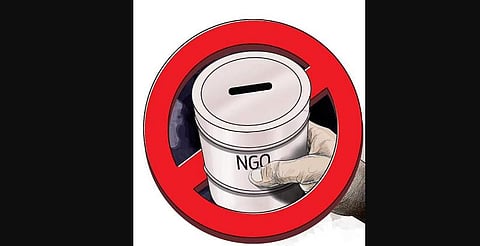

A few weeks ago, the Union government cancelled the licences of nearly 6,000 NGOs under the Foreign Contribution Regulation Act (FCRA). Non-renewal of licence essentially prohibits them from accepting any contribution from foreign donors. Several prominent and credible organisations were hit, including Mother Teresa’s Missionaries of Charity. The FCRA was amended in 2020, making the renewal process far more stringent, and other cumbersome banking stipulations were imposed. While there is a need to be diligent about foreign funding of NGOs, the manifestation of that caution need not be vexatious, suspicious, targeted and unfair. That impression can create collateral damage to the hard-earned reputation, respectability and acceptance of several well-meaning voluntary organisations. Whether or not such collateral damage was intended, in effect the damage is done. That the case of Missionaries of Charity was reconsidered favourably does not ameliorate the fallout.
Foreign funding of NGOs has always been regarded as suspicious by successive governments. Indira Gandhi had a well-known penchant for seeing a ‘foreign hand’ in every major national crisis, though they often turned out to be imaginary hands. However, the threat of funding anti-national and socially disruptive activities in the garb of social service cannot be smugly ruled out. But two questions merit attention. Terrorism and such anti-national activities do not take cover under a front NGO to get money. They have access to other blatantly illegal but proven means. Secondly, existing laws have sufficient agility to watch the source of foreign funds and to check for what purpose they are being utilised. No right-thinking citizen could argue that flow of foreign money into the coffers of NGOs should be unregulated. Nor can any government be credulous about it. The manner in which thousands of organisations are now denied the licence under FCRA (arguably on technical grounds and complaints) however defies this logic of reasonable precaution. Though the official arguments are factually correct, the government’s actions lack moral conviction and grace. In its eagerness to send certain pre-formulated messages, the government has overlooked the long-term damage that is being done to the secular and moral fabric of our multi-religious complex society. It has also underestimated the emotional quotient of several NGOs and the non-quantifiable value of the humanitarian services they selflessly render.
An unofficial justification for this ‘stringent and long-overdue’ action is that foreign money is used to lure people into conversion, particularly from among Hindus. Organisations working in the areas of human rights and environment are major suspects. Foreign contributions to such NGOs are seen as attempts to foment agitations against governments and create dissension in society. State power always loves to believe that popular resistance movements in the name of environment protection, human rights or social justice are manipulated by foreign agents and that people are being misguided. It is argued that ‘such subversions’ cannot go unchecked. Is it not the right of the affected people to react and resist when environmental vandalism parades as development and social deprivation masquerades as economic growth? By suggestively linking acceptance of foreign money to agitations that seek to protect human rights and environment, a shadow of suspicion is sought to be cast on the credibility and moral stature of all such genuine movements and organisations. The FCRA has thus been used as a tool not only to arrest the flow of funds from abroad but to stifle and eventually discredit the organisations. However, history reminds us that successful protests and dissents do not grow with the help of any external stimuli but by the emotional responses of the affected people. At a deeper level, such action takes away the fire from democracy and glorifies the silence of the meek.
Targeting NGOs that are providing humanitarian service to the most needy sections has much more grievous consequences. Governments may be the provider of several services. But delivery of services in government is often impersonal and treated as patronage rather than the right of citizens. Besides, privatisation of health, education and several services have already exiled millions of ordinary citizens lacking in income and livelihood from them. Confronted with expensive medical treatment and rendered vulnerable by spiralling living costs, and with social cohesion already strained, they turn to NGOs for support that the straight-jacketed government schemes cannot provide. Even when the money (often suboptimum) is provided by the government, official machinery, by definition, is incapable of emotions and compassion. It lacks the flexibility required to act in varied situations. It is this compassion gap that NGOs effectively address. What money cannot provide, emotional support can. And without that emotional bedrock, money has little value. There are countless activities these NGOs undertake, inspired by real concern and commitment. Thousands of NRIs who are eager to support these humanitarian services by NGOs in their hometowns are always sympathetic to their cause and are willing to financially support them. Yet, the organisations have no recourse to this support. When NGOs run short of money, the victims are evidently not the rich but the poor and the vulnerable.
Thus, not allowing an NGO to accept foreign donations has greater non-financial implications. The loss of credibility and the oblique shadow of suspicion can be devastating. It is deeply hurtful, if not exasperating, for impeccable organisations that have stayed afloat by sheer determination and commitment. Making them feel that their compassion is almost a crime strikes at the very core of voluntarism. The message that feeling for others and unselfish service and succour provided to thousands of needy people across the country is not appreciated by the state can be quite ominous. Penalising and discouraging citizens from offering solace, confidence and material help to the needy are indeed a bad omen.
K Jayakumar
Former Kerala chief secretary & ex-VC of Thunchath Ezhuthachan Malayalam University
(k.jayakumar123@gmail.com)